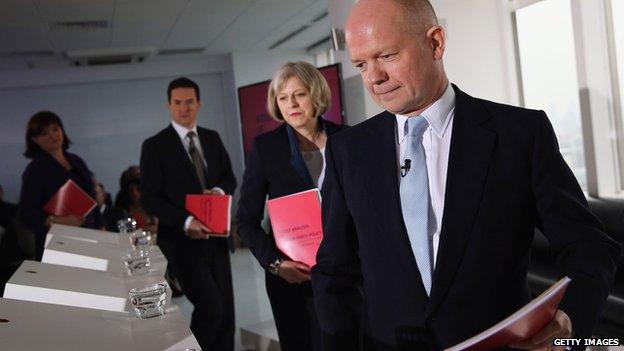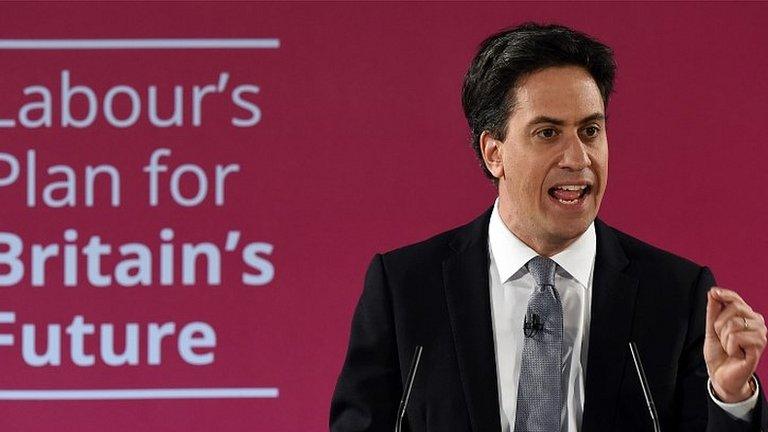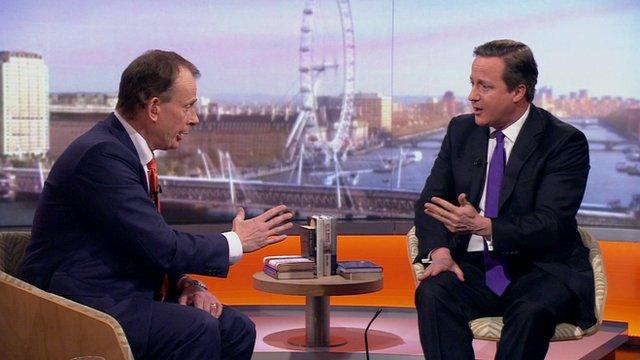Number crunching: Tory dossier on Labour spending
- Published

The Conservatives have released 82 pages of analysis of Labour spending plans saying that the party has promised £20.7bn of extra spending for which it has not yet found a way to pay.
If you're just back to work today after the holidays wondering if this feels like it's jumping the gun a bit ahead of a May election then you're not alone.
Labour disputes that it has promised to increase spending in the areas that the dossier says it has.
Take, for example, one of the more expensive items in the dossier, external, which says that Labour plans to cancel next year's local authority cuts. The Conservatives say this would mean Labour spending an extra £3.35bn next year.
To support this claim, the dossier includes 14 quotes from Labour frontbenchers, criticising the effects of local authority cuts on everything from libraries to public loos and from social care to street lighting.
But nowhere do any of the spokespeople say that they would cancel the cuts in 2015-16.
The dossier is based on what it calls a reasonableness test: "Any statement by a Labour frontbencher that a voter would believe to be a promise to spend money or raise revenue if Labour are elected is counted as a commitment."
Is that fair, or is criticising cuts just what opposition politicians do?
One of the items that has been discussed a great deal has been whether Labour would reverse the £83m cut to the Arts Council budget.
This assertion is supported by a quote from Harriet Harman, who says: "This Government is threatening the future of our arts and creative industries through slashing the Arts Council."
Does that mean that Labour will cancel all of the cut? Shadow chancellor Ed Balls told BBC News there would be no extra money for the Arts Council next year.
Shifting timescales
The Conservatives could argue that it was unfair of Labour to criticise its cuts if they were not going to reverse them, but it is hard to see this as a firm spending commitment.
And this is the problem on what is, for many, the first working day of an election year.
There has been much talk of getting the Office for Budget Responsibility (OBR) to audit the manifestos of the main parties so it's not left to civil servants guided by the assumptions of special advisers to do it.
We know that isn't going to happen for this election, because the OBR would have had to start work on the mechanics of it ages ago.
But it wouldn't have helped in this case anyway, because the manifestos are not out. They're not coming out for months.
So instead we're having to deal with Conservative assumptions about what Labour's spending pledges will be.
Take the biggest item of extra spending, the £3.7bn for giving borrowing powers to the Green Investment Bank.
The dossier confirms that Labour has not specified the timescale for the money to be borrowed by the bank, so it was assumed that it would be doing so over three years.
It could have been one year or it could have been 10 years, but the dossier assumes three years.
On the flip side, Labour's response to the dossier points to the Conservatives' £7bn a year of unfunded tax cuts, but that is also not a pledge for 2015-16, it is supposed to come in by 2020. And we have a whole host of budgets and spending rounds to get through before we would expect to find out how that can be funded.
The whole exercise may be a helpful lesson in needing to wait for the spending commitments to be made before you believe things said by political parties.
- Published5 January 2015

- Published5 January 2015
- Published4 January 2015
